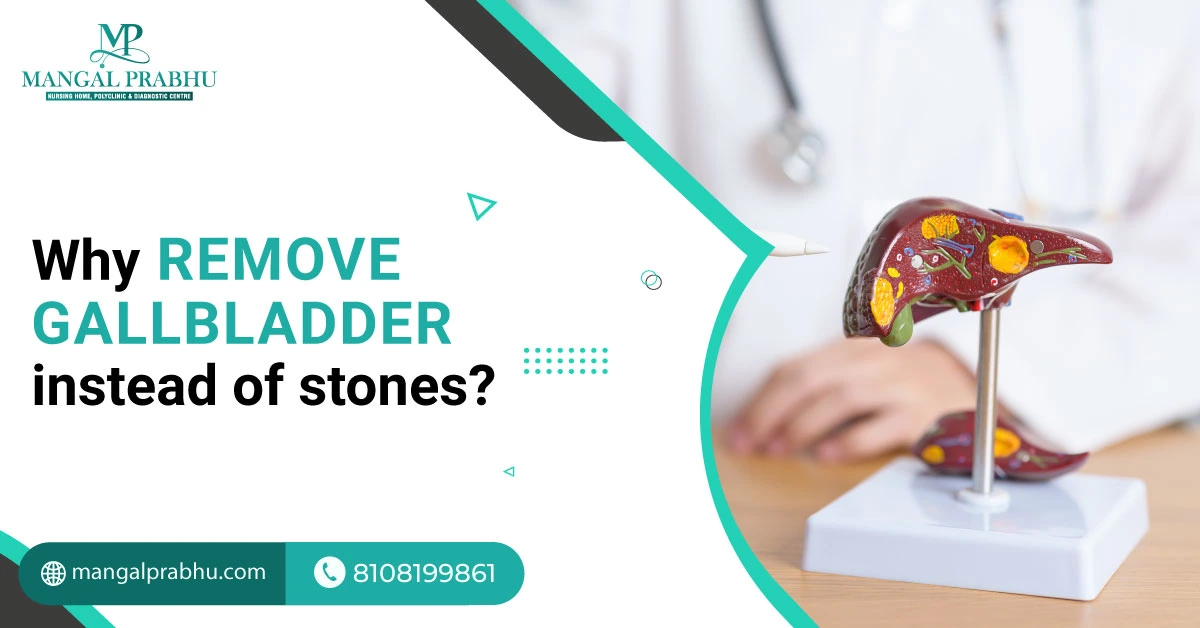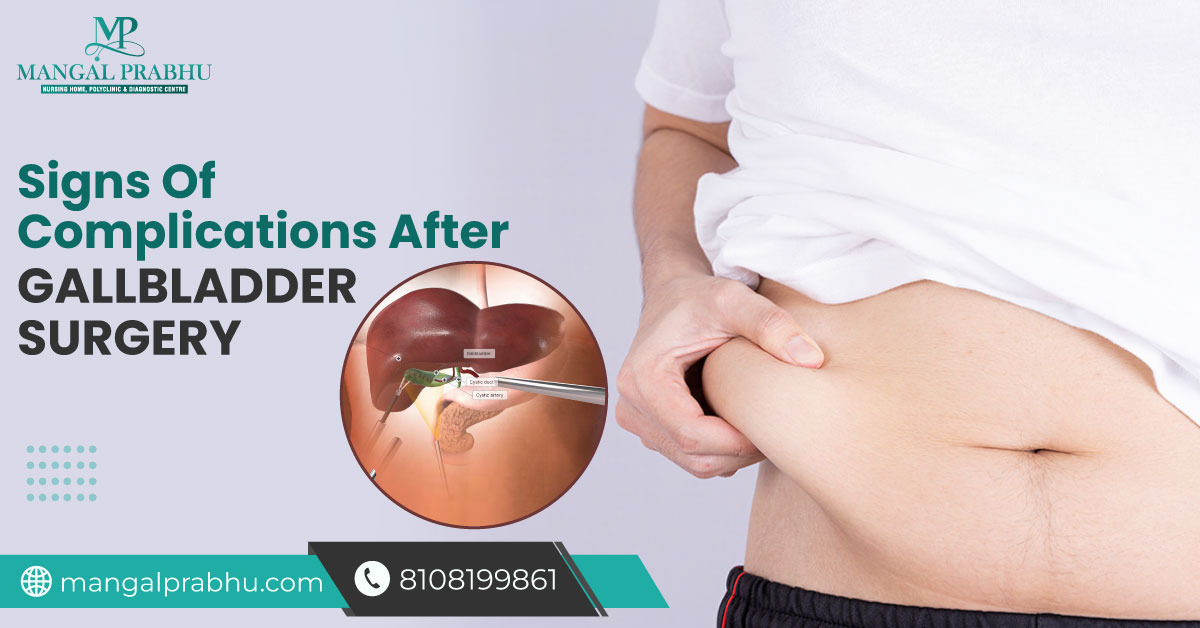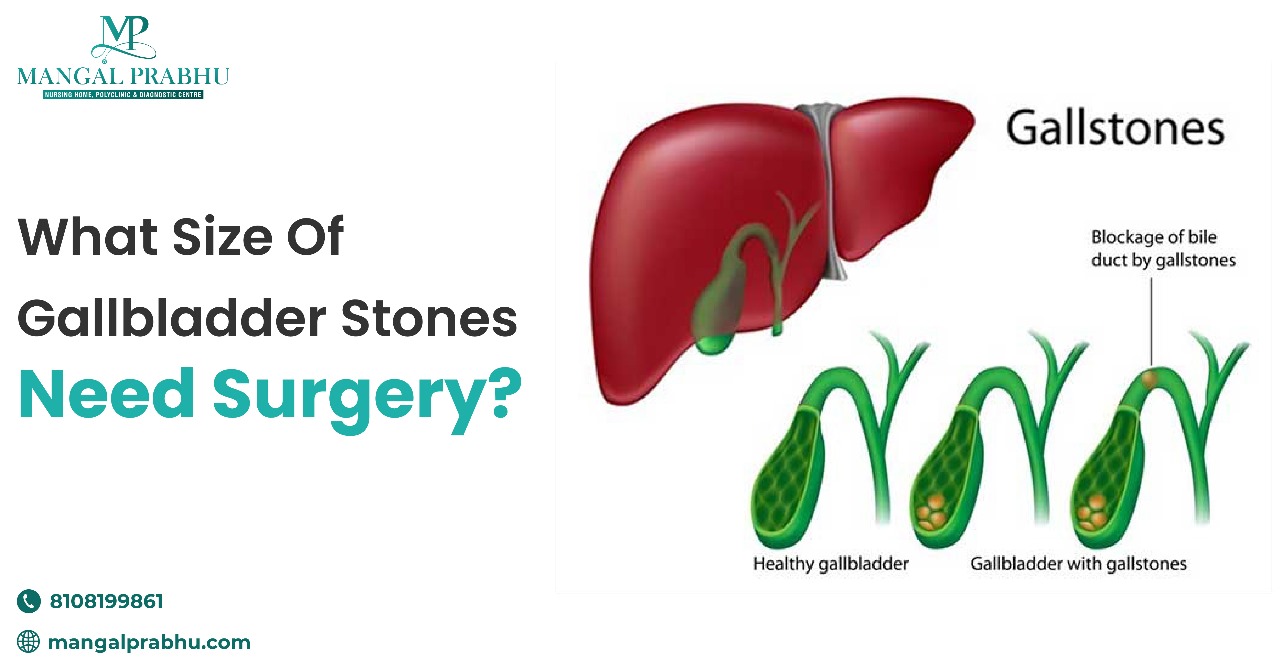
Why Remove Gallbladder Instead of Stones?
Excess cholesterol and bilirubin in the bile can result in hard deposits or gallstones, which form inside the gallbladder. Although a general surgeon in Navi Mumbai may recommend treatment to dissolve these stones or remove them, leaving the gallbladder intact, it’s often advised to have the entire gallbladder removed. To know why removing the gallbladder is a good move, let’s first understand what gallstones are and their symptoms.
Understanding Gallstones
The gallbladder is a pear-shaped organ that stores bile, a digestive fluid that aids in breaking down fatty foods. Occasionally, bile can harden, resulting in stone-like formations. These hardened deposits can vary in size and quantity. Here’s what individuals with gallbladder stones are likely to experience:
- Nausea and vomiting
- Bloating
- Pain in the upper right abdomen
- Back pain
- Jaundice
- Fever and chills
Some people do not experience any symptoms, while others report severe abdominal pain with fever, requiring immediate medical attention.
Treatment Options for Gallstones
If your gallstones are asymptomatic, you may not need treatment. However, if you experience the above symptoms, your doctor will discuss the below-listed invasive and non-invasive treatment options.
1) Non-surgical Treatments:
Medication to dissolve gallstones can help, but it is usually reserved for patients who are unable to undergo surgery. The medication may take months or years to dissolve the stones, and even if they are dissolved, there’s no guarantee that the stones won’t recur. Shock wave lithotripsy is another non-surgical way to remove gallstones with sound waves, but it is also rarely performed.
2) Lifestyle Changes:
Switching to a healthy lifestyle with low-fat diets and exercise can help prevent new stone formation but won’t remove the existing gallbladder stones.
3) Cholecystectomy:
A surgical removal of the gallbladder offers a permanent cure for recurring gallbladder stones. A minimally-invasive Cholecystectomy involves a laparoscopic removal of the gallbladder, thus a shorter recovery and fewer complications.
Why Remove the Gallbladder Instead of Just the Stones?
Cholecystectomy is a more preferred treatment for gallstones than removing just the gallstones or dissolving them with medication. Gallstones form because of an underlying issue with the gallbladder function. While you may remove the stones, the root cause that led to the stone formation in the first place won’t be fixed.
With cholecystectomy, you can have peace of mind knowing that the stones won’t recur, eliminating your risk of developing complications like jaundice, pancreatitis, cholecystitis, and biliary obstruction. Besides that, you can live a healthy and normal life without a gallbadder. Instead of being stored in the gallbladder, the bile will flow from the liver to the small intestine. You won’t experience any significant digestion change after the surgery.
Benefits of Gallbladder Removal
Here’s why the gallbladder removal surgery in Navi Mumbai an ideal choice for patients with gallstones:
- No chance of gallstone recurrence
- Prevents blockages, pancreatitis, and other gallstone-related complications
- Faster recovery
Cholecystectomy is an effective and safe treatment option for gallstone removal. The surgery offers long-term relief from the gallstone symptoms and prevents life-threatening complications. Since it doesn’t impact your digestive function, it’s the most preferred solution to gallbladder stones.

How to Sleep After Gallbladder Surgery?
Introduction
Gallbladder surgery can deliver relief from aches and soreness, whether it’s miles removal or other techniques. It is a necessary step towards stepped-forward fitness and health. However, the street to recovery has its problems with sleep; therefore, we’ll display you a few strategies that may assist in restful sleep after gallbladder surgical treatment. Visit Mangal Prabhu Hospital If you continue to face problems.
Understanding Gallbladder Surgery
A Gallbladder surgical operation is finished to find out issues like gallstones or other infections like inflammation that affect the organ. Though the surgical procedure aims to improve fitness and decrease signs, there nevertheless can be post-surgical treatment effects that can deliver aches, discomfort and modifications in digestion, all of which can disrupt sleep.
Post-Surgery Recovery and Sleep
The night after surgical operation can be a hard one for sleep as pain and soreness from the surgical areas and the aspect outcomes of medicinal drugs can make it hard to locate a snug sleeping position. Furthermore, it modifies the digestion and dietary regulations that could cause discomfort all through the night. Gallbladder Disease Treatment in Navi Mumbai offers an amazing remedy that can help in lowering the aftereffects of gallbladder surgical procedures.
Also Read: Signs Of Complications After Gallbladder Surgery
Tips for Better Sleep After Gallbladder Surgery
1. Establishing a Comfortable Sleep Environment
A sleep friendly environment is essential to sleep peacefully. Make sure your bedroom is cool, quiet and dark with a comfy pillow and bed. Think about the use of more pillows to lessen stress on the surgical website and help your frame.
2. Following Restful Sleep Hygiene Practices
Make limitations on the intake of caffeine and alcohol intake and decrease display screen time earlier than sleep. Good sleep hygiene is essential for restful sleep at some point in the recovery duration. Establish a regular agenda for the regular mattress and wake times throughout the recovery.
3. Incorporating Relaxation Techniques Before Bed
Relaxation strategies like deep respiration, mild stretching, or meditation can assist in calming the mind and frame earlier than bedtime. Gallbladder Surgeon in Navi Mumbai enables patients in each aspect. They ensure that the patient is having as few issues after surgery as possible. Take attention to setting up a recurring bedtime that includes these practices in an effort to help your body to help in sleep by way of signaling the frame that it’s time to unwind.
Conclusion
Recovering from gallbladder surgery is indeed a time-consuming procedure; endurance,self-care, and, now and again, extra attention to sleep aren’t clean for the patient who simply went through the surgery. Establishing precise sleep hygiene practices, snug sleep surroundings, and the usage of rest techniques earlier than the mattress can enhance the body’s recovery process and improve the overall sleep amount. It is essential to be gentle with yourself at some point this time and reach out to professional healthcare companies like Mangal Prabhu Hospital that assist in offering the best hospitality to the patient. Having proper care and hints to improve overall napping can make your post-surgical operation sleeping troubles.

Signs Of Complications After Gallbladder Surgery
The best gallbladder surgeon in Navi Mumbai at Mangal Prabhu Hospital removes gallbladder from the body which helps in eliminating the pain associated with gallstones. Besides relieving the pain of gallstones, it also helps in reducing various issues. However, life without a gallbladder does not change much but sometimes it would be best for an individual to learn the signs of complications associated with this treatment.
As every surgical procedure has some risk, Gallbladder surgery may also lead to some common and severe complications. Thus, recognizing the signs of complications after this surgery is essential and helps in ensuring a smooth recovery and reducing unforeseen medical issues. Therefore, this guide provides a quick insight into common complications associated with post-gallbladder surgery.
Common complications after gallbladder surgery
Some common complications that individuals may encounter post-gallbladder surgery may include:
1) Infection
Postoperative convalescence can resemble a controlled construction site, yet the potential for infections persists. Indicators such as erythema, edema, and discomfort around the surgical site serve as sentinel manifestations of an unwarranted microbial intrusion demanding prompt attention.
2) Bile duct injury
Analogous to a backstage malfunction, inadvertent bile duct injury during surgery can result in symptoms of bile leakage, abdominal pain, and jaundice, signaling a deviation from the anticipated convalescence trajectory.
3) Bleeding
Though a certain degree of drama is inherent in any surgical procedure, excessive bleeding merits heightened attention. Increased pain, unexpected bruising, or feelings of weakness act as signals, warranting investigation into potential complications.
4) Bowel injury
The adjacent bowels, susceptible to sensitivity, may experience disruption during surgery, leading to abdominal discomfort and triggering internal alarms in rare instances.
Also Read: A Comprehensive Guide To Gallbladder Stone Removal
Signs of complications after gallbladder surgery
i) Fever and chills
An individual may experience increased body temperature, chills, and fever which may show signs of infection.
ii) Severe abdominal pain
Some people may experience intense and persistent abdominal pain which may indicate complications with bile duct injury or internal bleeding.
iii) Jaundice
The emergence of a yellowish tint in the skin and eyes suggests a noteworthy development. Jaundice indicates potential complications and mandates prompt medical attention.
iv) Persistent nausea and vomiting
While postoperative digestive adjustments are expected, persistent nausea and vomiting suggest lingering complications, potentially in the form of infection or bile leakage.
When to seek medical attention
a) Immediate medical attention
If you find yourself entangled in the dissonance of chest pain, abdominal discomfort, or the breathless whispers of difficulty breathing, don’t hesitate—rush to the virtuosos at Mangal Prabhu Hospital for unparalleled gall bladder stones treatment in Navi Mumbai. Swift, emergency medical care isn’t just an option; it’s the overture to safeguarding your well-being and sidestepping potential risks.
b) Contacting the surgeon
If you find a hint of jaundice, fever, or unwelcome abdominal discomfort, then reach out to your surgeon. By consulting with your surgeon promptly, you can take immediate action, ensuring that any nuances in your recovery are met with expert precision.
Conclusion
As you navigate the post-gallbladder surgery landscape, being attuned to the signals your body sends is like having a backstage pass to your recovery. With a keen eye for signs of complications and prompt response, you can ensure better medical attention for a successful postoperative journey.

What Size Of Gallbladder Stones Need Surgery?
Gallstones Also called Cholelithiasis, gallbladder stones are the accumulation of digestive juices in a hard form in your gallbladder. These can vary in size, ranging from small grain-sized stones to tennis-ball-sized stones.
Irrespective of the size of these stones, they might require treatment as they pose a serious health threat if the stone travels to the bile duct. You can reach out to the gastroenterologist to discuss your treatment options. In the meantime, let’s learn more about gallbladder stones.
What Causes Gallbladder Stones?
A majority of gallbladder stones (around 75%) are made of cholesterol. So, those diagnosed with a higher level of cholesterol, whether because of obesity or diabetes, might develop gallbladder stones. Your liver filters cholesterol from the blood and sends it to the bile as a waste product.
Your bile duct secretes chemicals that dissolve the waste, including cholesterol. However, if the level of cholesterol in your blood increases beyond the normal level, the chemicals might be unable to dissolve them. This creates crystals, which eventually become stones. Other causes of gallbladder stones are excess bilirubin and gallbladder stasis.
What Are The Symptoms Of Gallbladder Stones?
Gallstones do not cause any problems unless they get lodged somewhere and lead to a blockage. If that happens, you might notice these symptoms:
- Extreme pain in the upper right abdomen
- The pain can radiate to different parts of your abdomen and can sometimes be felt on the shoulder blades.
- Nausea and vomiting
The pain might last for a few minutes to several hours and your upper abdomen can feel sensitive to touch.
Also Read: A Comprehensive Guide To Gallbladder Stone Removal
What Size of Gallbladder Stones Need Surgery?
As mentioned above, the symptoms you experience matter more than the size of the gallbladder stones. They can be as small as 1 centimeter but might require surgical removal of the entire gallbladder because of the painful symptoms.
Or, they could be big but cause no symptoms. Usually, gallbladder stone surgery is required when the hardened crystals have caused the blockage or the stones have led to other complications, like acute pancreatitis, or bile duct cancer.
Surgical removal of gallbladder stones is your best option to avoid any complications. For other non-invasive gallbladder stone treatments in Navi Mumbai, talk to a healthcare provider and get a diagnosis. They will check the size of these stones and the symptoms to recommend the most suitable treatment.
Laparoscopic surgery is the best for gallbladder stones. It has a faster recovery period and fewer complications than the open surgery counterpart.
What Are the Risks and Complications of Gallbladder Surgery?
You might have gas pain after a laparoscopic gallbladder stone surgery, as the gas is used to get a better view of your internal organs. There’s less risk of complications in laparoscopic surgery. In rare cases, infection, bleeding, or damage to the surrounding organs can cause complications.
Conclusion
Surgical removal of gallbladder stones is the best treatment option. The hardened crystals might not cause any symptoms initially, but there’s always a risk of infection and other complications present. So, it’s best to get them surgically removed.
